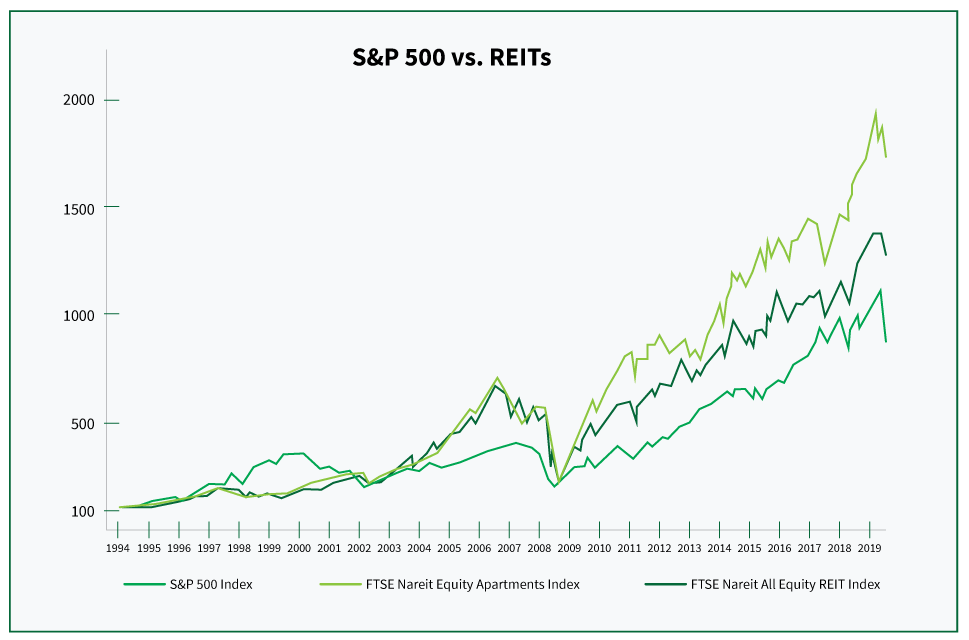Today, technology has introduced a multitude of new ways to invest in commercial real estate. While most investors benefit from diversifying their portfolios with real estate, there is no shortage of investment models to choose from.
In this guide, we examine two alternatives to direct ownership — REITs and real estate crowdfunding — and explain the differences between them. While both models allow for an opportunity to access cash flow from commercial real estate properties without the drawbacks of property management, there are key distinctions to each avenue of investment.
REITs
A real estate investment trust (REIT) is an investment vehicle that owns and manages income-generating real estate or makes loans to owners of real estate. There are two types of REITs that one can invest in — public REITs and private REITs.
A public REIT is a simple way to invest in real estate, as the structure is similar to that of any public company. Through the purchase of individual stock, a mutual fund, or an exchange-traded fund (ETF), REIT investors can earn dividends without the work of managing or financing the properties themselves.
The purpose of a public REIT is to return profits to investors. Additionally, REIT investments are liquid, and an investor can choose to sell anytime.
Many investors choose REITs as they historically deliver steady dividend income and long-term appreciation through stock price increases. REITs, when compared to the stock market, bonds, and other assets, have had a long-term track record of reliability.

While a REIT’s purpose is to create shareholder value, public REITs are only as good as their management. Real estate is a complex business that requires deep industry experience and close relationships with strong partners. REITs must do the work of managing investment property portfolios or loan portfolios through long-term real estate cycles.
Additionally, the value of public REIT shares fluctuates with the greater equities market. Shareholders may lose value in their investment even if the REIT’s underlying real estate properties aren’t losing value.
Private REITs are similar in many ways to public REITs, but with one large and significant distinction – they are not traded on any of the public stock exchanges. While this can eliminate some risk of market fluctuations, private REITs offer little to no liquidity as the shares cannot be sold quickly like shares in a publicly traded REIT. Additionally, the barrier to entry is higher than with a public REIT. Investors who want to participate in a private REIT must qualify under guidelines that management establishes, which often excludes those that are not high-net-worth individuals. Private REITs can be less transparent with investors as compared to public REITs, which have more extensive SEC reporting requirement.
These are important factors to consider when choosing how to invest in commercial real estate.
Real Estate Crowdfunding
Many still ask how real estate crowdfunding works, as it is still a relatively new way to passively invest in real estate. Real estate crowdfunding pools investment capital from online investors to join together to buy a particular property or portfolio.
Unlike public or private REITs, crowdfunding allows investors to choose a particular property without having to rely on someone else to select their investment choices. Additionally, crowdfunding investors have more flexibility to invest in different types of real estate such as, multifamily or industrial assets. Direct ownership and most REITs often commit investors to a single property type.
Today, real estate crowdfunding has grown into a multibillion-dollar industry after the passing of the Jumpstart Our Business Startups Act in 2012. Previously, only high-net-worth individuals or people with the right connections were able to access institutional real estate investments.
Many have taken advantage of this new opportunity. Real estate is the most popular form of investment crowdfunding, with some industry sources stating there are $2.5 billion worth of crowdfunded real estate investments in the United States. By 2025, that number is expected to reach over $300 billion.

Additionally, crowdfunding can offer a more stable way to invest than traditional investment paths, such as the stock market, and a more lucrative way to invest than a savings account or 401K funds. Multifamily real estate has outperformed the stock market 3 to 1 over the past 15 years.
Online real estate crowdfunding makes investing easy and accessible, and many platforms offer low barriers to entry with no requirements for a large outlay of capital. However, many new crowdfunding platforms are tech-oriented, with no historical record of accomplishment in real estate.
The real estate expertise of a crowdfunding platform’s leadership is crucial to ensuring that the focus of the platform is laser-focused on the asset itself. Unfortunately, many platforms were founded by venture-backed technology entrepreneurs whose experience and focus often lies in building the technology platform itself.
Successful real estate deals require active management by real estate experts with years of experience and long track records of successful investments, which cannot be expected of most online crowdfunding platforms.
As part of The Arbor Family of Companies, ArborCrowd was the first crowdfunding company launched by a real estate institution — and is not backed by venture capital.
“ArborCrowd entered the market as the only crowdfunding platform associated with an established real estate company,” Sam Chandan, the dean of New York University’s Schack Institute of Real Estate noted. “How its founder leveraged that differentiator presents an excellent case study opportunity for students and professionals interested in innovation and disruption in real estate finance.”
The NYU Schack case study, titled Real Estate Investment Meets the Crowd, the Case of ArborCrowd and Real Estate Crowdfunding, analyzed ArborCrowd’s differentiated model and serves as a foundation for students to learn about the growing crowdfunding industry, and is now integrated into the Schack Institute’s curriculum.
Read the full case study, or learn more about real estate crowdfunding in a conversation with NYU Schack Dean Sam Chandan and ArborCrowd Co-Founder and CEO Adam Kaufman.
The Difference
REITs and Real Estate Crowdfunding share many similarities. Both allow investors to diversify portfolios from the traditional bond and stock markets while producing value from the real estate property itself. Both models allow investors to pool capital to invest in a wide range of real estate — without the drawbacks of direct ownership.
Some primary differences between investing in real estate crowdfunding or a REIT comes down to access, transparency, and management.
- Public REITs are easy to buy and sell but may be subject to more market volatility. Real estate crowdfunding has a higher barrier to entry, but can be subject to less market volatility.
- Real estate crowdfunding allows investors direct transparency into where their money is being invested, whereas REITs are an investment in a vehicle that invests your money into real estate without investor input.
- Real estate crowdfunding and REITs have differing levels of management expertise, dependent on the platform or REIT itself.
Conclusion
Whatever investment vehicle you choose, it’s important to understand the pros and cons of each option. The ability to invest in high-quality real estate, which can produce high internal rate of returns (IRR), and equity multiples has only fairly recently been made accessible to those without huge sums of money to invest.
Moreover, REITs and real estate crowdfunding both allow ample opportunity for investors to diversify a portfolio with real estate. Investors should educate themselves and evaluate their strategy and goals in order to choose the investment model that meets their unique objectives.
Learn more about ArborCrowd’s unique model, and how it works.
